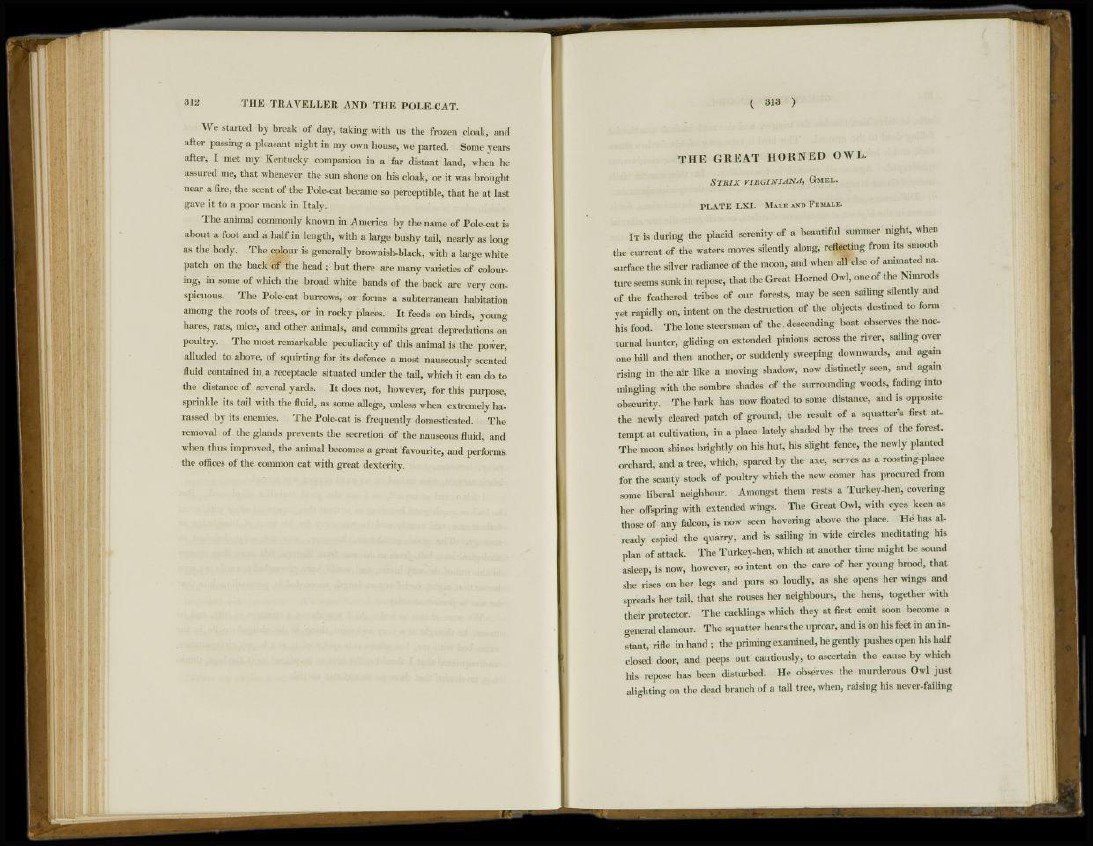
312 THE TRAVELLER AND THE POLE-CAT.
We started by break of day, taking with us the frozen cloak, and
after passing a pleasant night in my own house, we parted. Some years
after, I met my Kentucky companion in a far distant land, when he
assured me, that whenever the sun shone on his cloak, or it was brought
near a lire, the scent of the Pole-cat became so perceptible, that he at last
gave it to a poor monk in Italy.
The animal commonly known in America by the name of Pole-cat is
about a foot and a half in length, with a large bushy tail, nearly as long
as the body. The colour is generally brownish-black, with a large white
patch on the back of the head ; but there are many varieties of colouring,
in some of which the broad white bands of the back are very conspicuous.
The Pole-cat burrows, or forms a subterranean habitation
among the roots of trees, or in rocky places. It feeds on birds, young
hares, rats, mice, and other animals, and commits great depredations on
poultry. The most remarkable peculiarity of this animal is the power,
alluded to above, of squirting for its defence a most nauseously scented
fluid contained in a receptacle situated under the tail, which it can do to
the distance of several yards. It does not, however, for this purpose,
sprinkle its tail with the fluid, as some allege, unless when extremely harassed
by its enemies. The Pole-cat is frequently domesticated. The
removal of the glands prevents the secretion of the nauseous fluid, and
when thus improved, the animal becomes a great favourite, and performs
the offices of the common cat with great dexterity.
C 313 )
T H E GREAT HORNED OW L.
STRIX VIRGINIANA, GMEL.
P L A T E L X I . MALE A N D F E M A L E .
I T is during the placid serenity of a beautiful summer night, when
the current of the waters moves silently along, reflecting from its smooth
surface the silver radiance of the moon, and when all else of animated nature
seems sunk in repose, that the Great Horned Owl, one of the Nimrods
of the feathered tribes of our forests, may be seen sailing silently and
yet rapidly on, intent on the destruction of the objects destined to form
his food. The lone steersman of the. descending boat observes the nocturnal
hunter, gliding on extended pinions across the river, sailing over
one hill and then another, or suddenly sweeping downwards, and again
rising in the air like a moving shadow, now distinctly seen, and again
mingling with the sombre shades of the surrounding woods, fading into
obscurity. The bark has now floated to some distance, and is opposite
the newly cleared patch of ground, the result of a squatter's first attempt
at cultivation, in a place lately shaded by the trees of the forest.
The moon shines brightly on his hut, his slight fence, the newly planted
orchard, and a tree, which, spared by the axe, serves as a roosting-place
for the scanty stock of poultry which the new comer has procured from
some liberal neighbour. Amongst them rests a Turkey-hen, covering
her offspring with extended wings. The Great Owl, with eyes keen as
those of any falcon, is now seen hovering above the place. He has already
espied the quarry, and is sailing in wide circles meditating Ins
plan of attack. The Turkey-hen, which at another time might be sound
asleep, is now, however, so intent on the care of her young brood, that
she rises on her legs and purs so loudly, as she opens her wings and
spreads her tail, that she rouses her neighbours, the hens, together with
their protector. The cacklings which they at first emit soon become a
general clamour. The squatter hears the uproar, and is on his feet in an instant,
rifle in hand ; the priming examined, he gently pushes open his half
closed door, and peeps out cautiously, to ascertain the cause by which
his repose has been disturbed. He observes the murderous Owl just
alighting on the dead branch of a tall tree, when, raising his never-failing